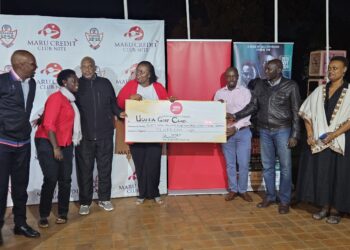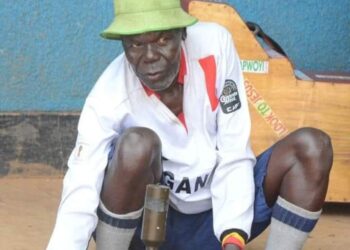By Allen Kisakye
Cancer homes can be very haunting, especially if you are not suffering from any of the several cancers.
Being Cancer Month, I took time off to meet and talk with patients at Cancer Charity Foundation.
The foundation is a Bukoto-based cancer home that houses about 18patients, battling all sorts of cancer. It’s from here that patients from far flung areas reside as they undergo chemotherapy at Mulago Hospital every two weeks as opposed to the more expensive option of travelling to and from their home districts.
One of them is AberNwaguma.
Formerly a hairdresser in Gulu, Nwaguma came to Kampala this year in June for her cancer treatment.
My eyes kept wandering over her chest. She noticed and quickly gives me an answer. She lost her left breastto cancer in June this year.
“Life has always punished me in all angles that I currently feel immune to pain,” she said.
But life becameharderfrom the day doctors told her that she had cancer.
“I am HIV positive and thought it was my biggest battle,” she says.
She was born with the disease and for 32 years, she has been battling with the disease. Until she was told she had cancer.
“I felt so helpless and bitter about life.”
She believes she might have had cancer for seven years before realising it.
“People who learnt about my cancer started to give me‘sad looks’, which ideally made me feel like I would die the next second. I looked at my child and most of the times I couldnot hold back the tears,” she said.
Nwagumawas already a struggling single mother with three children. However, it’s her last born that she was worried about.
This was mainly because the babies’ father abandoned them the moment he heard that she was pregnant.“When he knew about the pregnancy, he told me to abort the baby something I could do, he then left me and never came back,” she said. The older children are aged 14 and 13.
Luckily, she got a job as a hairstylist. The job was not as fulfilling but atleast she managed to provide for older two children as the pregnancy developed. Still, she did not know her status.
“I would always feel very cold, feel dizzy and sick, but still I had to work and prepare myself for the baby who was on the way,” she says.
Also, she would occasionally feel something hard on her breast and as time went on, it started to grow some wounds
“But I would always use Cipro to treat the wound, it would take them three to four days and they still came back,” she narrates
She says that shegave birth normally and since she is HIV positive, the doctors told her to breast feed for six months. The baby was negative.
One of the breasts had wounds, she recalls.
“The nipple was deformed and I couldnot use it to breast feed,” she says.
Yet all this time, she could not suspect to have cancer.
“Doctors used to say that the wound on my breast might be a side effect from the ARVs; this always kept me in the dark about the disease. One day, my ex-husband’s aunty saw the breast and referred me to Lacor Hospital Gulu for cancer screening,” she said.
The cancernews came at a time when she was helpless, with little strength to work yet she had a six-month baby girl.
“Everything was going on wrong in my life,” she says.
However, what hurt her the most was thatwhen the doctors presented her the results, she expected some counseling and guidance.
“But no I didn’t get it. The doctor just told me to prepare money for the operation, he couldn’t even tell me the level my cancer had reached,” she said.
She had to look for Shs50,000required for the operation.“When the operation was done I was referred to MulagoHospital for further treatment.”
Her mother escorted her to Mulago. She also brought along her six-months-old child.

But life at Mulago was harder than thecancer itself.
They slept on the hospital veranda with a baby for over six weeks waiting for treatment. Her neighbour on the hospital floor had tuberculosis, and as a mother, she feared that her baby would contract it.
“Every new day was worse than the previous one at Mulago,” she says, adding that everytime it rained at night it was a nightmare.
“The baby would cry. Then I would get all these kinds of looks from other patients we shared the cold and wet veranda with. Sometimes, I would look at my chest without a breast and I would think about how the caner was spreading and I would wonder, ‘why me God?’”
After weeks of long cold nights, she finally got an appointment with the doctor who advised her to take samples of the breast that was cut off for testing at LMK Clinic, Kampala.
“As I was still struggling with what to eat the next day, the doctor presented me a bill of Shs680,000for laboratory.I laughed and cried at the same time wondering where I had to get the money from.”
This was towards the end of June.
Over the course of two months, Nwaguma looked for andcollect the money,something she says delayed her treatment.
Over the course of time however, one of the doctors felt sorry about Nwaguma’s baby and the condition shehad unwillingly exposed herto. He recommended her to Cancer Charity Foundation, a place she currently calls home.
“They told me about their boarding house that takes care of people with cancer. And that is how I made my way here,” Nwaguma, who can currently afford a smile says.
“But before they could tell me where we were going, I just couldnot stop smiling and thanking them because at that time, any place was better than Mulago Hospital, they took me in with my child.”
Chemotherapy and Hospice
When I started chemotherapy, it had a strong side effect on me.
“I would feel dizzy most times. The treatment also brought me a lot of sores in the mouth. That is when another patient I met at the cancer home recommended me to Hospice Uganda,” she says.
Hospice is an organisation that supports people living with HIV or cancer.
Doctors at Hospice were touched on hearing her story and decided to help her out with the baby who by then was close to making a year.
“They suggested that my baby be taken for adoption atNsambya Babies Home. And even though I miss her, I know she is fine and in good hands,” she said. Luckily the baby was born free of HIV/Aids.
Her other elder kids now live with their father.
“IfI am to die now, I want my mourners to say that at least I tried to fight it,” she says.
Do you have a story in your community or an opinion to share with us: Email us at editorial@watchdoguganda.com











